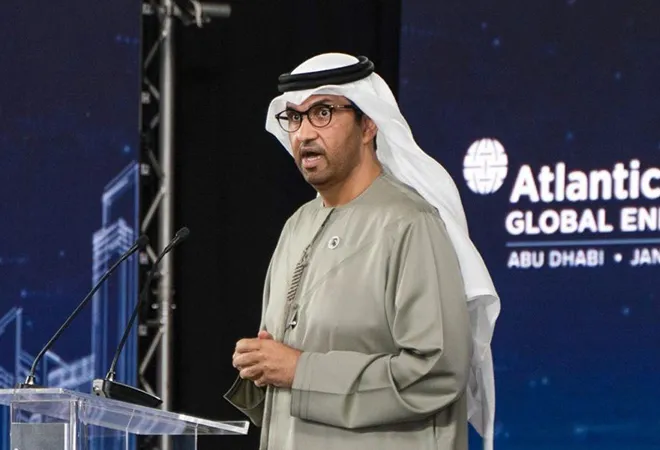-
CENTRES
Progammes & Centres
Location
The criticism of Sultan al Jaber's appointment as COP28 president might be well-meaning but the rush to judgement reflects an incomplete understanding of both the host country and the individual.

More recently, ADNOC along with sovereign fund Mubadala and power generation company Taqa have taken a stake in Masdar and outlined their aim to become one of the top five players globally in the green hydrogen spectrum as a fuel for the future. The newly established green hydrogen unit of Masdar plans to produce one million tonnes of green hydrogen and derivatives by 2030, catering both to domestic demand and the export market.
As CEO of Masdar, al Jaber also played a vital role in executing the vision of the country’s leadership to encourage the International Renewable Energy Agency (IRENA) to set up its headquarters in Masdar City, Abu Dhabi. IRENA now has 167 countries plus the EU as its members and plays a lead role in guiding and supporting green energy transitions. It also provides member states with updated analyses on areas like innovation, technology, policy, finance and investment. Incidentally, India has assumed the Presidency of the 13th Assembly of IRENA when it met in Abu Dhabi on January 14, 2023. These facts speak for themselves.UAE hardly fits the stereotype of an oil-rich nation that is happy to live off the bounty provided by its fossil fuels. Over the last 15 years, it has embarked on a restless drive to become a catalyst in the search for technologies that enable more sustainable development pathways. The Barakah nuclear plant, the pioneering role of Masdar and the support to organisations like IRENA and platforms like ADSW are just a few of the examples.
And Sultan al Jaber isn’t just the CEO of ADNOC. He is also UAE’s Minister for Industry and Advanced Technology and was the country’s Special Envoy for Climate Change from 2010 to 2016 and again from 2020 onwards.Over eight years in that role and representing UAE at previous CoPs has given him a thorough insight into the complex challenges of sustainable development. I have seen him at close quarters during my term as India’s ambassador to UAE and observed both his can-do, problem solving approach and his incredible stamina for putting in the long hours that his latest role will require. He clearly has the support and confidence of Sheikh Mohammed bin Zayed.
I have also seen the access that he enjoys with government and business leaders and others by virtue of the multiples hats that he continues to wear. In his address at the Atlantic Council’s Global Energy Forum in Abu Dhabi on January 14 soon after being designated President of COP28, al Jaber was candid in acknowledging the need to go much further and faster, calling for a trebling of renewable energy output from 8 to 23 terawatt hours and promising to work on the challenges of mitigation, adaptation and loss and damage suffered by the most vulnerable countries. Let us give him the chance to do that. There is a broad consensus that while the last few COPs have made incremental progress, they have failed to produce the kind of breakthrough needed to address the challenges. The urgency of the climate crisis needs a different approach and UAE just might be the country that helps bridge the gap between the global North and South to produce a breakthrough.The views expressed above belong to the author(s). ORF research and analyses now available on Telegram! Click here to access our curated content — blogs, longforms and interviews.